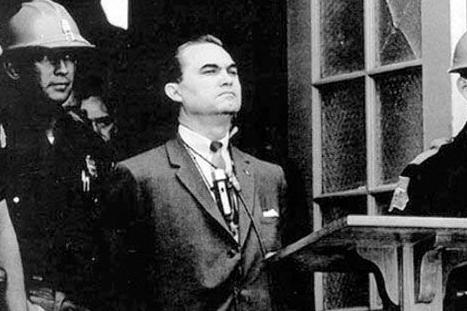On this day in 1963, the University of Alabama was desegregated by order of President John F. Kennedy. Alabama Governor George C. Wallace stood in the path of federal marshals as they escorted the first Black students, Vivian Malone and James Hood, to enroll at the state’s flagship university.
Wallace said “segregation now and forever” before stepping aside and allowing the two Black students to enroll before he was physically removed by the marshals and federalized Alabama National Guard troops.
An altercation between the troops and Wallace’s Alabama State Trooper escort likely would have set off a riot.
The new governor’s “stand in the schoolhouse door” was nationally televised and made him a nationwide celebrity. His wife Lurleen succeeded him in 1966; governors could not run for consecutive terms then. In 1970 Wallace defeated incumbent Albert Brewer, who was elevated on Lurleen’s death in 1968. Wallace was reelected in 1974, and a final time in 1982.
The U.S. Supreme Court declared segregation of schools to be unconstitutional in the 1954 Brown v. Board of Education decision. The civil rights movement attempted to enroll Black students at the University but was blocked by Wallace. That led Kennedy to intervene and nationalize the Alabama National Guard to force the Governor to accept desegregation.
Malone and Hood were successfully enrolled despite a mass number of University of Alabama students turning out to support Wallace.
In 1965, Malone received a Bachelor of Arts in business management and became the first Black student to graduate from the University of Alabama. In October 1996, she was chosen by the George Wallace Family Foundation to be the first recipient of its Lurleen B. Wallace Award of Courage. At the ceremony, Wallace said, "Vivian Malone Jones was at the center of the fight over states' rights and conducted herself with grace, strength and, above all, courage." In 2000, Malone Jones gave the commencement address at the University of Alabama, and the university bestowed on her a doctorate of humane letters. Additionally, in 2004, the Alabama State Legislature honored her by passing a resolution in commemoration of her outstanding achievements. She died at age 63 on October 13, 2005.
Hood left the university after only two months but returned in 1995 to begin earning his doctorate degree. On May 17, 1997, he received a Ph.D. in interdisciplinary studies. Wallace planned to give Hood his degree, but poor health prevented him from attending the ceremony. Hood himself was convinced Wallace had been sincere about this, as he wrote in an interchange following a PBS documentary on Wallace, Setting the Woods on Fire. Hood attended Wallace's funeral in 1998, imploring others to forgive Wallace as he had, since Wallace had publicly apologized for his previous actions. Hood passed away at his home in Gadsden on January 17, 2013, at the age of 70.
The events of June 11, 1963, made Wallace a celebrity and fueled his attempts to run for the presidency of the United States; but ultimately Wallace grew to regret his actions that day and in later years met amicably with both Malone and Hood.
To connect with the author of this story, or to comment, email brandon.moseley@1819News.com.
Don’t miss out! Subscribe to our newsletter and get our top stories every weekday morning.










